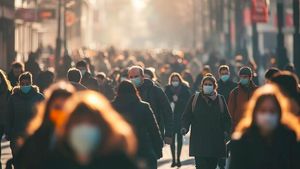JAKARTA - The Ministry of Transportation issued Regulation of the Minister of Transportation (Permenhub) Number 41 of 2020 concerning Control of Transportation in the Context of Preventing the Spread of COVID-19.
This rule replaces Permenhub No. 18/2020, which one of which regulates passenger capacity at only 50 percent. With this new regulation, the special passenger capacity for long-distance aircraft and trains has been increased to 70 percent.
Minister of Transportation Budi Karya Sumadi explained that this capacity change was in line with the Circular of the Task Force for the Acceleration of Handling COVID-19 Number 7 of 2020 which allows everyone to travel again with certain conditions during the COVID-19 period.
"Air transportation sets a limit on the number of passengers to a maximum of 70 percent of the total seating capacity by implementing health protocols. So, the only places provided are on the side (corner) and roadside, with 70 percent," Budi said in an online teleconference, Tuesday, 9. June.
In addition, the Director General (Dirjen) of Air Transportation Novie Riyanto said that the increase in capacity to 70 percent for narrow body and wide body aircraft is in accordance with international aviation regulations.
"If health protocols are met, for example passengers must wear masks, keep the cabin cleaned, there is not much interaction between passengers, then 70 percent is actually still loose, according to the requirements," said Novie.
Novie continued, all airlines must provide protocols to anticipate in case of someone getting sick on the plane. Those who are sick must be placed in a safe isolation room on board.
"Of course there are rules or special treatment for these passengers, for example turning off the air conditioner in the room specifically for the isolated sector," said Novie.
The passenger capacity of long-distance trains has also increasedFurthermore, passenger capacity on trains has also been increased to 70 percent. The additional capacity will take effect Monday, 12 June. This is because at that time the policy of the Extraordinary Railway, which limited travel to only a few stations, had ended and the operation of regular trains began to open gradually until it returned to normal.
"The additional capacity in phase 2 is not immediately high, we will start to increase it 70 percent. Of course, there are protocols that are strengthened, especially health. If it is conducive, the capacity can be increased to 80 percent (in the next phase)," said Director General of Railways Zulfikri.
There are a number of conditions that must be met when increasing the capacity of train passengers. First, the railway operator must be declared healthy. At work, they are required to wear a face shield. Meanwhile, passengers are required to wear a mask.
Then, the operator is required to provide an isolation room in the carriage if a passenger is showing symptoms of illness as well as providing medical personnel. Passengers who fall into the vulnerable category, such as the elderly and children, must also be grouped in different carriages from productive age passengers.
"In addition, there must be the provision of mask sales at stations at affordable prices, providing applications or queuing systems, and cleaning facilities," explained Zulfikri.
Furthermore, all passengers who intend to travel on planes and trains must still meet the requirements set by the Task Force for the Acceleration of Handling COVID-19. First, they are required to carry identity such as KTP or other identification.
Then, must have a PCR test certificate with a negative result. The PCR test certificate is valid for 7 days from the time of departure. Meanwhile, those with a certificate of rapid test with non-reactive results are valid for 3 days upon departure.
For people whose areas do not have a COVID-19 examination facility, they can have a symptom-free certificate such as influenza, issued by a hospital doctor or puskesmas.
The English, Chinese, Japanese, Arabic, and French versions are automatically generated by the AI. So there may still be inaccuracies in translating, please always see Indonesian as our main language. (system supported by DigitalSiber.id)








